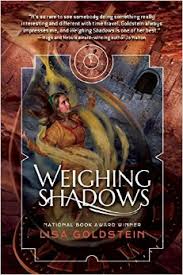Weighing Shadows
Lisa Goldstein
Night Shade Books, 318 pgs.
Trade paper $15.99
ebook $15.99
One of my favorite subgenres of science fiction is time travel, so when Night Shade Books sent me a review copy of Weighing Shadows, I was looking forward to reading the book. (Thank you, Brianna Scharfenberg, for sending the review copy.) I wasn’t the target audience for the book, it turned out, but it’s still a well-written novel that will find an audience.
Ann Decker is working in a deadend job in a computer shop when a mysterious woman recruits her for a new job at a company called Transformations Incorporated. At first Ann doesn’t know much about the job, but since she hates working in the computer shop, she takes it.
It turns out that Transformations Incorporated is based in the future and specializes in time travel. They’re trying to improve things in their time period by manipulating events in the past. It’s not long before Ann is approached a resistance group within Transformations Incorporated. The bulk of the novel concerns Ann’s struggles with deciding where her loyalties lie, although it’s not hard to see what her final conclusion will be. The number of times a person can travel in time is limited, so the missions operatives are sent on are chosen carefully. Ann’s first mission is to ancient Crete, her second to the Library of Alexandria, and the third to France in the Middle Ages.
First, what I liked about the book. Goldstein is an accomplished writer who can not only tell a story, but tell it well. She develops a set of terms the time travelers use, such as “tace” to refer to time and place. Goldstein wisely only uses a few of these terms, so that not only are they easy to follow, the quickly become an intergral part of the experience of reading the book. It’s a fine line between the made-up jargon becoming overwhelming and being ignorable. Goldstein makes it look easy.
Goldstein picks some time periods that aren’t the typical ones and introduces historical figures many readers may not have heard of. The historical detail is intricate enough that more than once I stopped reading to learn more about the background.
I wasn’t the target audience for this book, and I’ll explain why in the following paragraphs. I will say this, though. Goldstein’s writing kept me reading when I probably would have put the book down for good had it been written by a less capable author.
There were two things though that didn’t work for me. First, the blurb at the top of the front cover refers to the book as doing something different with time travel. Uh,…not really. I know it isn’t fair to Ms Goldstein, but try as I might, I couldn’t help but thinking of the late Kage Baker’s Company series. Baker’s work, of which I am a huge fan, was also about a company from the future engaging in time travel and manipulating events in the past, although Baker’s Company was more sinister and she put more restrictions on changing history. Plus Baker’s series involved immortal time traveling cyborgs and not ordinary people. As far as the basic use of time travel, I didn’t see a huge difference in how the two authors used it. Of the two applications of a company from the future interfering in the past, I prefer Ms. Baker’s. Like I said, I realize the comparison isn’t necessarily fair, and I did my best not to compare the two.
That’s a minor point. The thing that really didn’t work for me was everything moving towards a feminist utopia. I’m not a huge fan of utopias to begin with; I just don’t find them believable. But normally I can go along with the premises behind one if those premises aren’t too unrealistic.
The woman who tries to recruit Ann to the resistance keeps saying that every change the company makes favors patriarchal societies over more feminist societies. (That’s a loose paraphrase on my part.) All the men, except for one who dies early on and may be a member of the resistance, are portrayed as uncaring brutes. The argument the resistance makes boils down to women will always do a better job of governing than men.
I call bullshit. Women are no better or worse than men in general. People are individuals, and they each react to things differently and do things differently. There are good women leaders and terrible women leaders, just as there are good male leaders and terrible male leaders. I wouldn’t have had a problem with Ms. Goldstein’s approach, or the uptoian aspects of the story, if she hadn’t made nearly all of the male characters brutes or bullies, and all of the men who had a major role. All the characters portrayed as good or noble were women. If she had made some of the men more sympathetic, I would have enjoyed the book more. As it was, the longer I read, the more Ms. Goldstein substituted message for story. And while there is an audience for fiction that preaches, I’m not a member of that audience.
Again, this was a well-written novel. While it wasn’t to my taste, I’d be willing to read something else by Ms. Goldstein.
